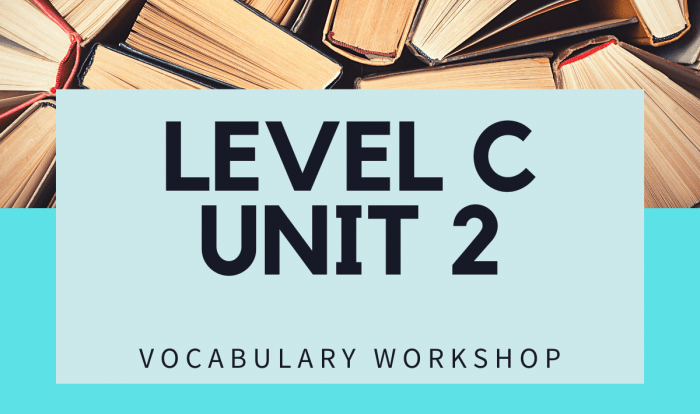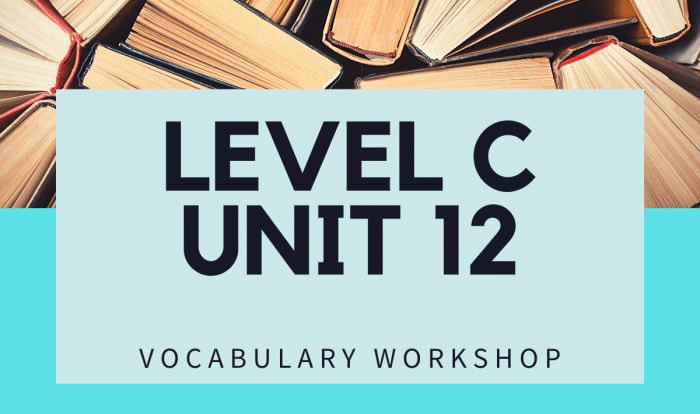Embark on a linguistic adventure with Unit 6 Vocabulary Level F! This comprehensive guide unlocks the intricacies of language, empowering you to express yourself with precision and eloquence.
Delve into a curated list of vocabulary words, explore their etymological roots, and master their usage in diverse contexts. Expand your vocabulary horizons and elevate your communication skills to new heights.
Definition and Meaning
Unit 6 Vocabulary Level F encompasses a collection of advanced vocabulary terms and phrases that are crucial for expanding your linguistic proficiency and enhancing your communication skills.
Mastering this vocabulary level enables you to express complex ideas, engage in nuanced discussions, and comprehend sophisticated texts with greater ease and confidence.
Word List and Etymology: Unit 6 Vocabulary Level F
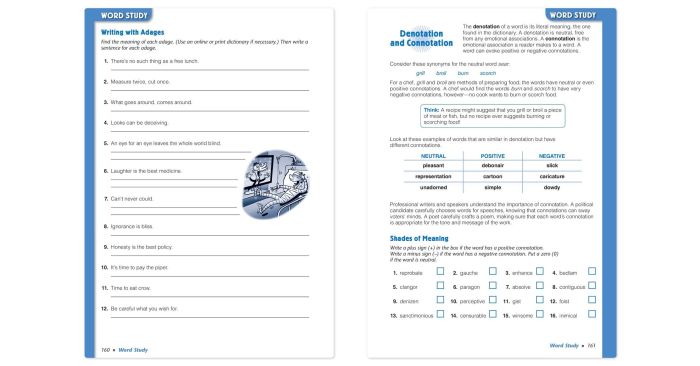
Unit 6 Vocabulary Level F introduces a range of words that expand our vocabulary and provide insights into their historical roots.
Etymology, the study of word origins, unveils the fascinating journeys that words have undertaken throughout history. By delving into the etymologies of these words, we gain a deeper understanding of their meanings and nuances.
Vocabulary Words
- Abrogate: Latin abrogare, “to repeal a law”
- Accolade: French accolade, “embrace”
- Aesthetic: Greek aisthetikos, “pertaining to perception”
- Anachronism: Greek anakhronismos, “out of time”
- Anathema: Greek anathema, “accursed thing”
- Anomaly: Greek anomalos, “irregular”
- Antipathy: Greek antipatheia, “aversion”
- Apocryphal: Greek apokryphos, “hidden”
- Apotheosis: Greek apotheosis, “deification”
- A posteriori: Latin a posteriori, “from the latter”
Contextual Usage
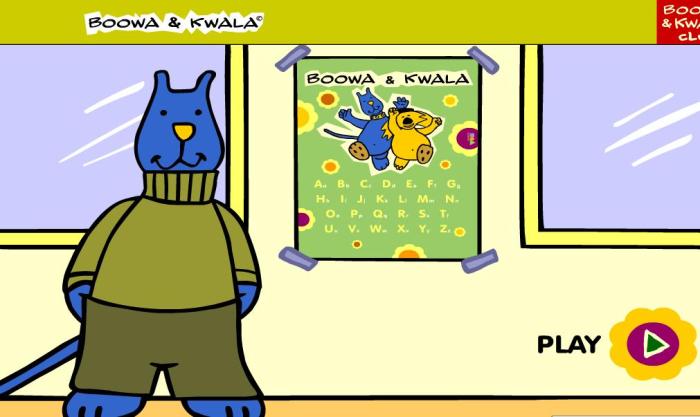
Understanding the contextual usage of vocabulary words is crucial for effective communication. In this section, we will explore how the vocabulary words from Unit 6, Level F, are employed in various contexts.
Examples of Sentences and Phrases
To illustrate the correct usage of these words, let’s delve into some examples:
- Abrogate:The government abrogated the treaty, officially ending its validity.
- Amenable:The suspect was amenable to questioning, providing cooperative responses.
- Antediluvian:The ancient ruins stood as antediluvian remnants of a forgotten civilization.
- Appease:The king attempted to appease the angry mob by promising concessions.
- Coalesce:The disparate groups coalesced into a unified front, working together towards a common goal.
- Exacerbate:The economic crisis exacerbated the already dire living conditions.
- Impeccable:The scholar’s research paper exhibited impeccable grammar and flawless logic.
- Indomitable:Despite countless setbacks, the explorer remained indomitable, determined to complete his expedition.
- Inherent:The inherent beauty of the painting captivated all who beheld it.
- Ostracize:The community ostracized the dissident, shunning him for his unconventional views.
- Prodigal:The prodigal son returned home after squandering his inheritance.
- Quixotic:The knight embarked on a quixotic quest, driven by unrealistic ideals.
- Recalcitrant:The recalcitrant student refused to cooperate with the teacher, disrupting the class.
- Reprehensible:The politician’s reprehensible behavior shocked the nation.
- Reverent:The pilgrims approached the holy shrine with reverence, filled with awe and respect.
- Strident:The politician’s strident voice echoed through the auditorium, demanding attention.
- Taciturn:The taciturn man rarely spoke, preferring to keep his thoughts to himself.
- Transient:The transient nature of life was a constant reminder of its fragility.
- Vapid:The vapid conversation offered no substance or intellectual stimulation.
Synonyms and Antonyms
Exploring synonyms and antonyms deepens our understanding of vocabulary words. Synonyms are words with similar meanings, while antonyms express opposite meanings. Understanding these relationships helps us expand our vocabulary and use words precisely in different contexts.
Synonyms
Synonyms provide alternative ways to express the same idea. For example, the word “loquacious” means “talkative.” Its synonyms include “chatty,” “garrulous,” and “voluble.” While these words share the general meaning of being talkative, each has subtle nuances. “Chatty” suggests a friendly and informal conversation, while “garrulous” implies excessive or even annoying talkativeness.
“Voluble” emphasizes fluency and ease of speech.
Unit 6 vocabulary level f can be a bit challenging, but it’s nothing to worry about. If you’re wondering how hard the GROL test is, here’s a link to an article that discusses it in detail. Anyway, coming back to unit 6 vocabulary level f, it’s important to stay focused and practice regularly.
With consistent effort, you’ll master these words in no time.
Antonyms, Unit 6 vocabulary level f
Antonyms present contrasting meanings. For instance, the antonym of “loquacious” is “taciturn.” Taciturn individuals are quiet and reserved, the opposite of being talkative. Other antonyms for “loquacious” include “reticent,” “silent,” and “uncommunicative.”
Parts of Speech and Usage
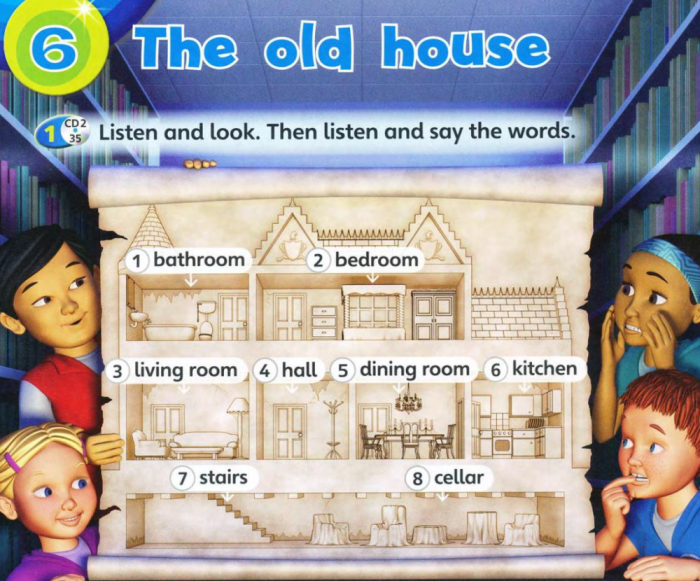
Vocabulary words can be classified into different parts of speech, each with its own function and usage in sentences.
Here’s a breakdown of the parts of speech for the vocabulary words in Unit 6 Level F:
Nouns
- Celebrity:A famous or well-known person.
- Civilization:A society that has developed a complex social structure and technology.
- Confidence:A feeling of self-assurance and belief in one’s abilities.
- Culture:The beliefs, customs, and behaviors of a particular group of people.
- Economy:The system of producing, distributing, and consuming goods and services in a society.
- Education:The process of acquiring knowledge, skills, and values.
- Entertainment:Activities that provide amusement or enjoyment.
- Environment:The natural world and the conditions in which organisms live.
- Government:The organization that governs a country or state.
- History:The study of past events and the development of societies.
- Industry:A particular branch of economic activity.
- Language:A system of communication using words, sounds, gestures, or symbols.
- Law:A set of rules and regulations that govern a society.
- Media:The means of communication, such as television, radio, newspapers, and the internet.
- Medicine:The science and practice of diagnosing and treating diseases.
- Military:The armed forces of a country.
- Music:An art form that uses sound to express ideas and emotions.
- Nature:The natural world, including plants, animals, and landscapes.
- Politics:The process of making and enforcing laws.
- Population:The total number of people living in an area.
- Religion:A system of beliefs and practices concerning the cause, nature, and purpose of the universe.
- Science:The systematic study of the natural world and the laws that govern it.
- Society:A group of people living together in an organized community.
- Sports:Physical activities that involve competition or recreation.
- Technology:The application of scientific knowledge to practical purposes.
- Transportation:The movement of people or goods from one place to another.
- Universe:The totality of all matter, energy, and space.
- War:A state of armed conflict between countries or groups.
Verbs
- Achieve:To reach a goal or objective.
- Contribute:To give something to a cause or effort.
- Create:To bring something new into existence.
- Discover:To find something new or previously unknown.
- Explore:To investigate or search for something.
- Invent:To create something new and useful.
- Learn:To acquire knowledge or skills.
- Make:To produce or create something.
- Produce:To create or bring something into existence.
- Solve:To find a solution to a problem.
- Teach:To impart knowledge or skills to someone.
- Use:To employ something for a purpose.
- Write:To create something written, such as a book or article.
Adjectives
- Ancient:Very old or from a long time ago.
- Beautiful:Pleasing to the senses or the mind.
- Civilized:Having a complex social structure and technology.
- Confident:Having a strong belief in oneself.
- Cultural:Relating to a particular culture.
- Developed:Having a high level of economic and technological advancement.
- Educational:Relating to education.
- Entertaining:Providing amusement or enjoyment.
- Environmental:Relating to the environment.
- Governmental:Relating to government.
- Historical:Relating to history.
- Industrial:Relating to industry.
- Linguistic:Relating to language.
- Legal:Relating to law.
- Medical:Relating to medicine.
- Military:Relating to the military.
- Musical:Relating to music.
- Natural:Relating to nature.
- Political:Relating to politics.
- Religious:Relating to religion.
- Scientific:Relating to science.
- Social:Relating to society.
- Technological:Relating to technology.
- Universal:Relating to the entire universe.
Adverbs
- Easily:Without difficulty or effort.
- Generally:In most cases or situations.
- Historically:In the past or according to history.
- Industrially:In an industrial manner or context.
- Legally:In accordance with the law.
- Musically:In a musical manner or context.
- Naturally:In a natural manner or context.
- Politically:In a political manner or context.
- Religiously:In a religious manner or context.
- Scientifically:In a scientific manner or context.
- Socially:In a social manner or context.
- Technologically:In a technological manner or context.
- Universally:In a universal manner or context.
Thematic Connections
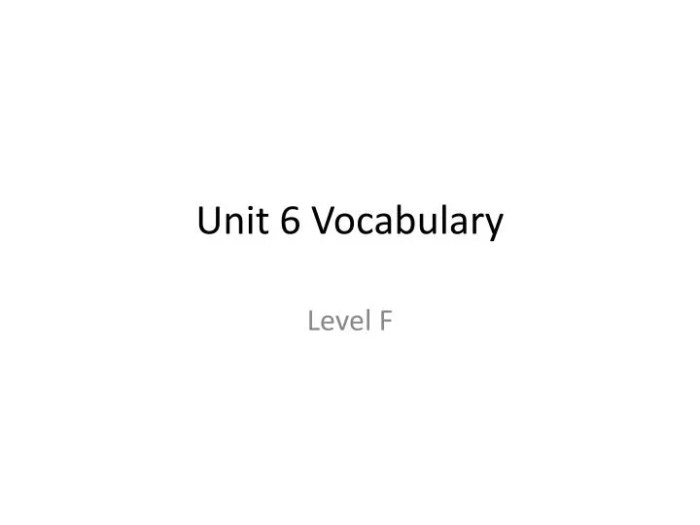
The vocabulary words in “unit 6 vocabulary level f” are united by several overarching themes and concepts. These include:
The nature of reality:Many of the words in this unit explore the nature of reality and how we perceive it. Words like “illusion,” “hallucination,” and “mirage” all refer to experiences that challenge our understanding of what is real and what is not.
The Power of the Mind
Several words in this unit also highlight the power of the mind and its ability to shape our experiences. Words like “imagination,” “creativity,” and “intuition” all refer to mental processes that can influence our thoughts, feelings, and actions.
The Importance of Perception
Finally, many of the words in this unit emphasize the importance of perception. Words like “perspective,” “bias,” and “prejudice” all refer to ways in which our own beliefs and experiences can shape how we interpret the world around us.
Practice Exercises
Reinforcing vocabulary understanding through practice exercises is crucial for effective learning. These exercises provide opportunities for students to apply their knowledge, identify areas of improvement, and enhance their retention of new words.
Fill-in-the-Blank Exercises
Fill-in-the-blank exercises require students to complete sentences by choosing the appropriate vocabulary word from a given list. This activity helps students associate the meaning of the word with its context.
- The scientist’s groundbreaking discovery earned him international __________. (acclaim)
- The politician’s speech was filled with __________, appealing to the emotions of the audience. (demagoguery)
- The ancient ruins were a testament to the __________. of the once-great civilization. (grandeur)
Matching Exercises
Matching exercises pair vocabulary words with their definitions or synonyms. This activity reinforces word recognition and helps students establish connections between related concepts.
- A.Quixotic
- B.Egregious
- C.Ephemeral
- D.Laudable
- 1.Outlandishly impractical
- 2.Short-lived
- 3.Commendable
- 4.Conspicuously bad
Sentence Completion Exercises
Sentence completion exercises present students with incomplete sentences and ask them to fill in the blank with a suitable vocabulary word. This activity tests students’ understanding of the word’s meaning and its appropriate usage.
- The new museum exhibit was a(n) __________ of the artist’s extraordinary talent.
- The politician’s __________ rhetoric swayed the public opinion in his favor.
- The __________ nature of the situation made it difficult to plan for the future.
Assessment and Evaluation
Assessing students’ comprehension of vocabulary words is essential to gauge their progress and provide targeted support. Here are several effective assessment methods:
Quizzes
- Multiple-choice quizzes with options including synonyms, antonyms, and definitions.
- Short-answer quizzes where students provide the definitions or use the words in sentences.
- Fill-in-the-blank quizzes where students complete sentences with the correct vocabulary words.
Essays
Essays allow students to demonstrate their understanding of the words in context and their ability to use them effectively. Essay topics could include:
- Analyzing the impact of specific vocabulary words on the meaning of a text.
- Exploring the relationship between vocabulary and a particular theme or concept.
- Using vocabulary words to develop persuasive arguments or support claims.
Presentations
Presentations enable students to showcase their understanding of vocabulary words through creative and engaging formats, such as:
- Skits or role-plays that demonstrate the usage of the words in real-life situations.
- Visual presentations that include definitions, synonyms, and examples.
- Interactive games or activities that reinforce the meanings of the words.
FAQ Explained
What is the significance of Unit 6 Vocabulary Level F?
Unit 6 Vocabulary Level F represents a crucial stage in language acquisition, expanding your vocabulary and enhancing your ability to comprehend and express complex ideas.
How can I effectively utilize the vocabulary words?
Regular practice is key. Incorporate the words into your daily conversations, writing, and reading materials. Seek opportunities to use them in different contexts to solidify their meaning and usage.
Are there any resources available for additional practice?
Yes, numerous online resources, such as flashcards, quizzes, and interactive games, can provide additional practice and reinforcement of the vocabulary words.
